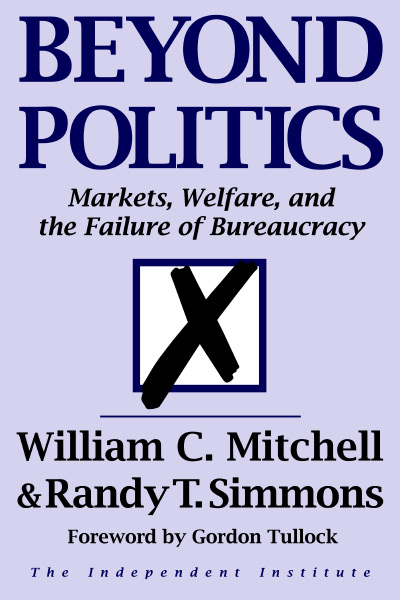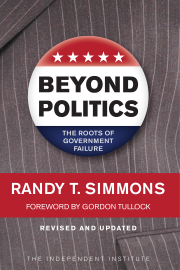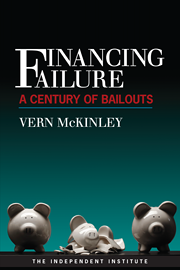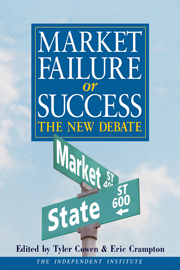| List Price: | ||
| Price: | $32.30 | |
| Discount: | $5.70 (Save 15%) |
| List Price: | ||
| Price: | $32.30 | |
| Discount: | $5.70 (Save 15%) |
Overview
Traditional public policy and welfare economics have held that “market failures”—the presumed inability of a free market to deliver certain goods and services deemed to be in the public interest—are common and require government intervention to protect the public welfare. But is this actually the case?
This book carefully scrutinizes this view through the modern theory of public choice, and systematically explains how government is producing a scandal of political myopia, bureaucratic self-interest, pressure group manipulation, economic stagnation, and public distrust.
The authors emphasize the actual, rather than ideal, workings of governments. They trace the anatomy of “government failure” and a pathology of political institutions as government has become the vehicle for private gain at public expense. Social welfare, consumer protection, education, trade, and crime are some of the topics the authors examine.
Offering a powerful perspective on market processes, property rights, politics, and government bureaucracy, this book is a lucid and comprehensive study of the foundations of a free and humane society.
Award:
Sir Antony Fisher International Memorial Award (1995)
Contents
- Section I: Market Failure and Political Solutions—Orthodoxy
- Chapter 1: Market Failure and Government Intervention—The View from Welfare Economics
- Chapter 2: Political Presuppositions of the Idealized State
- Section II: In Dispraise of Politics—Some Public Choices
- Chapter 3: The Unromantic Side of Democracy
- Chapter 4: Pathological Politics—Government Failure
- Section III: The Anatomy of Public Failure
- Chapter 5: Politics of Providing Public Goods
- Chapter 6: Politics of Private Gain—Producer-Rigged Markets
- Chapter 7: Politics of Private Gain—Government Exploitation
- Chapter 8: Politics of Private Gain—Consumer Protection
- Chapter 9: Politics of Private Gain—Environmental Goods
- Chapter 10: Politics of Private Gain—Coercive Redistribution
- Chapter 11: Micro-Politics of Macro-Instability
- Section IV: In Praise of Property, Profits, and Markets
- Chapter 12: Rediscovery of Markets, Competition and the Firm
- Chapter 13: Privatization, Deregulation and Constitutionalism
Detailed Summary
- Increasingly, the American people view politics as a contemptible, corrupting burden, wherein politicians and bureaucrats cater to special interests to the detriment of the general public. Low voter turnout, gloomy public opinion polls and acerbic chatter on radio talk shows are symptomatic of a political cynicism that has reached new heights. Beyond Politics now systematically explains how government has produced a scandal of political myopia, bureaucratic self-interest, pressure group manipulation, economic stagnation and public distrust.
- The public’s anger as evidenced in the landmark 1994 electoral firing of the Democratic leadership will only be lessened through major reductions in the costs of government and the social and economic problems produced by the pervasive government bureaucratization of American life. Beyond Politics traces through the fundamental reforms now necessary, without which even greater political upheavals will be in store for both major parties, as voters come to view both as ineffectual.
- The cost of politics to American society is enormous. For example, about 3,200 trade associations located in Washington, DC, employ an estimated 100,000 people, or 187 people for each member of Congress. More than 4,000 political action committees court members of Congress to influence government policy and personnel. The average U.S. Senator must raise around $10,000 per week throughout his or her six-year term for re-election campaign expenditures.
- Lobbying at the state level is also significant. For example, more than 500 lobbyists spent over $12.5 million in 1987 to influence Washington state’ s legislature, approximately $85,000 per member. In 1989, lobbyists spent more than $1.6 million on worker’s compensation legislation in Oregon—a state with 2.9 million citizens.
- In contrast to the consumer-sovereignty of competitive markets, political decision-making works to serve and enrich special interests at the expense of the general public. For example, America’s protectionist trade restrictions cost Americans approximately $70 billion per year. During the late 1970s and early 1980s, the federal government spent over $250 billion annually on subsidy programs.
- By 1983, nearly 33 percent of all U.S. citizens received direct government funding through non-means-tested programs. Most beneficiaries were middle class clients of such programs as Social Security, Medicare, unemployment compensation and veterans benefits. Another 19 percent were welfare recipients receiving food stamps, Medicaid, Aid to Families with Dependent Children, and subsidized housing.
- Business cycles are manipulated for the political gain of incumbent politicians and bureaucrats. Of the six U.S. presidential elections from 1959 to 1981, four witnessed an expanded money supply prior to the election and a contraction soon after.
“Market failure” has been the rationale for government’s recurrent interventions to solve numerous problems, real and imaginary: pollution, monopoly, unemployment and inflation, social injustice, poverty, illiteracy, and many others. But governments—liberal and conservative alike—tend to worsen social problems and create new ones as the inescapable problem of what is in fact “government failure” takes hold, a failure rooted in the very workings of politics and government bureaucracy. The new book, Beyond Politics, shows that the problems created by “government failure” are profoundly more enduring, serious and pervasive than the problems commonly attributed to markets.
Authored by William Mitchell and Randy Simmons, the illuminating and lively book, Beyond Politics, examines how modern political democracy functions and falters. The book’s aim is to free us of the misconceptions and false hopes that predispose us to favor public policies bound to fail—and to examine systematically why they fail. Mitchell and Simmons analyze numerous case studies of “government failure” in contemporary America, revealing that, “most of what is commonly viewed as `market failure’ is misunderstood, caused by governmental policies.” Indeed, the book shows that “government failure,” rather than “market failure,” is the inescapable constant in social problems, endemic to the way western political democracies currently operate.
Beyond Politics is realistic about politics. Forsaking the romanticized view of government as omnipotent, benevolent provider, Mitchell and Simmons ask not what would we like from government? But rather, what can we expect from government—given its knowledge, incentives and constraints? What kind of knowledge does politics use and generate? How do political incentives affect government behavior? How do political economic, budgetary, technical and cultural factors limit government’s capacities? Given the risks of government failure, should we continue to expand the scope of government? If not, what barriers to reform must we overcome? And what political presuppositions must we change to do this? Without answering these questions, Mitchell and Simmons demonstrate, public opinion leaders and policy-makers naively and recklessly court futility or disaster.
Beyond Politics applies the insights of the burgeoning “public choice” school of political economy, which studies political choices and institutions using economic reasoning and analysis. “[Standard] economic conceptions and tools, although helpful were inexact for use in political theory,” recalls public choice pioneer Gordon Tullock in the book’ s foreword, “and hence it was necessary to develop new ones.” These new conceptions and tools have forged a revolution in thinking about government and, as Mitchell and Simmons argue, help us to diagnose and treat the dysfunction of democratic political rule.
Private Agendas, Perverse Incentives and Pathological Politics
Unlike many books on politics and public policy, Beyond Politics does not assume that public servants, even in advanced democracies, have the means or intent to represent their constituents faithfully, let alone to always “promote the general welfare and secure the blessings of liberty.” The book insists that politicians and government bureaucrats, like consumers, business owners and private sector employees, all necessarily have individual, private agendas in their work—agendas based on self-interest which are not magically discarded upon donning public-employee robes. Because of the high cost for voters to monitor them closely, public employees may stray far from their professed agendas, as they enlarge budgets, expand perks and build careers. But, this is only the first of many causes of government failure identified by Mitchell and Simmons.
Consider the group dynamics of the democratic process. Voters, interest groups, politicians and bureaucrats exert enormous effort fighting for political spoils. Through voting, lobbying, log rolling and maneuvering, their conflicting agendas produce compromises with unintended consequences. Few get everything they seek, but nearly everyone gets something. Although many regard this result as a great virtue of democracy, such virtue is illusory. While the compromises may suppress the symptoms of social discontent in the short turn, in the long run the underlying conflicts often break out in more virulent form.
The process of democratic conciliation contains a perverse mechanism. Typically, government handouts and favors are closely guarded by their recipients, while the costs are hidden from the less organized but greater numbers of people who bear them. This imbalance creates an opportunity for well-organized constituents and pressure groups to gain parasitically from their fellow citizens through stealthy wealth transfers. As these groups push for more, and others copy their success, democratic inertia favors further rounds of cannibalistic feeding at the public trough. Even well-intended programs run by conscientious bureaucrats will diverge dramatically from their proclaimed original intent.
In case after case, Mitchell and Simmons argue, public policy is driven, shaped or distorted by narrow groups who manipulate the political process to fit their private agendas. This pursuit of private gain in politics is a major obstacle hampering government efforts “to do the right thing”—even when public servants know how, want to and otherwise could. Beyond Politics shows how such “political entrepreneurship or opportunism” or “rent seeking,” as its called in public choice, contributes to government failure in taxation, public schooling, consumer and environmental regulation, trade and agricultural policy, central banking, unemployment and social welfare programs, antitrust, and a host of other policies.
The Clean Air Act is typical of legislation resulting more from the influence of political entrepreneurs than from its ostensible concern. Like much environmental legislation, the Clean Air Act claimed that markets injure third parties physically or economically by creating unwanted spillover effects or “negative externalities.” But most environmental problems, including pollution, result not from markets and property rights, but from the externalities produced where they are prevented from existing—the “tragedy of the commons,” where resources are managed collectively by government in public domains where environmentally unsound decisions stem from political influence, and the property rights of injured parties are neither recognized nor defended. So, instead of creating incentives to reduce pollution or protect those being harmed, the Clean Air Act mandated power plant technology to benefit the more politically influential producers of less efficient, high sulfur coal in the eastern U.S. at the expense of more efficient, low sulfur coal producers in the West. Not surprisingly, the Act’ s leaders in Congress were from West Virginia, a major power base for both the predominantly eastern-oriented coal industry and the United Mine Workers.
Another popular argument is that government must provide so-called “public goods,” such as roads, schools, parks, police—goods deemed essential, but, due to their alleged non-excludability of use by consumers, are viewed as unprofitable for the private sector to produce. It is commonly thought that not enough people would voluntarily pay for them, attempting instead to “free ride” off others who have paid. But Mitchell and Simmons observe numerous fundamental flaws in this “public goods” argument. First, no goods or services are purely “public goods,” and all such goods have been and are increasingly provided privately (parks, lighthouses, roads, security guards, and so forth) and have a long history of private provision. Today, technological improvements are now enabling private entrepreneurs to minimize most free riding, and thereby make it even more profitable to provide such goods. Furthermore, in no way does government provision eliminate the free rider problem. On the contrary, by socializing the cost of producing goods through government, those in positions of greater political influence will stand to benefit at the expense of those politically less powerful. And since government-provided public goods tend to be provided in single quantities equally available to all citizens regardless of their preferences, the same citizen can be under-supplied with some public goods and over-supplied with others.
Ironically, most recipients of government largess, fixated on extracting more from the transfer system, fail to realize that they also lose on net from this negative-sum game, because their gains are greatly offset as they subsidize the booty of others also seeking benefits. In addition, political entrepreneurs sooner or later must pay significantly in order to play. To protect their privileges from envious rivals or angry taxpayers, they will likely spend princely sums lobbying officials and rallying public support. The rate of diminishing returns from rent-seeking varies case by case, of course, but for society overall and for most political entrepreneurs, rent-seeking becomes a lose-lose game. Again, the total cost is largely hidden: the social deadweight losses resulting from the rent-seeking/transfer game also include the unrealized benefits of what would have been created had labor and capital been employed enlarging the economic pie through the market process, instead of wrestling for its shrinking pieces.
Mitchell and Simmons suggest that the “high school civics” view of political democracy is colored by rose-tinted glass. Although their view roughly parallels Adam Smith’s “invisible hand” theory of the market process, market entrepreneurship differs profoundly from political entrepreneurship. Mitchell and Simmons argue that political and market processes differ fundamentally in what they can offer, the means of making these things available, and the constraints they face. Government interventionism tends to destroy social harmony.
Market Carrots versus Government Sticks
Since the publication in 1776 of Smith’s treatise The Wealth of Nations, economists have often remarked that the market process is a powerful engine of creativity, ingeniously enlisting the self-interest of each to serve the self-interest of others. The self-interested pursuit of profit is assisted by the price system, which helps to communicate consumer preferences and permits calculation of which alternative methods and innovations create the greatest economic value while using the least-valued combination of inputs. When market entrepreneurs miscalculate badly or consistently, Mitchell and Simmons reiterate, sooner or later they lose out to visionaries alert to the profit opportunity, enterprising enough to marshal the needed resources, able to effectively manage their internal divisions of labor and gutsy enough to take the risks. Because the private use of force is outlawed, they must achieve their ends entirely by persuasion. Day after day, market entrepreneurs must offer positive values to their customers, or get pushed aside—they cannot last long by offering “lemons” or running negative advertising campaigns.
Some call this weeding-out process “the survival of the fittest,” failing to distinguish the peaceful cooperation and competition of the market from the coercion embodied in the jungle of the political system’s wars which use government power over the citizenry. In direct contrast to this coercion of political control, the voluntary exchange of markets is more precisely “the survival of the providers.” Successful market entrepreneurs provide solutions to economic problems. Though this process of social coordination is not widely understood, its precepts have been at least partly accepted into public discourse. Much less understood, Mitchell and Simmons explain, are the foundations on which the market rests and the significance of the polar differences between the signaling and feedback mechanisms of the market process and those of politics.
In contrast to the marketplace, legitimate feedback in the political arena is infrequent and indirect. Nothing in the political process tends to promote the solving of economic problems or the enhancement of social coordination. Politicians lack market standards for measuring success, and rely for feedback on well-organized political entrepreneurs (special interest groups) or uninformed voters. Bureaucrats set in motion by politicians are even less accountable to voters. Even when informed about the issues, voters cannot express their intensity of preferences as effectively through periodic elections as they can every day in the marketplace by voting with their pocketbooks.
Lacking the means and incentives to maximize value and conserve inputs, politicians and bureaucrats must build their empires by dispensing tax-funded favors and expanding, not economizing, their budgets. Parasitism prevails because they do not create wealth—they appropriate it from Peter to pay off Paul, and vice versa.
But the greatest difference between political and market entrepreneurship, Mitchell and Simmons remind, is that politicians and bureaucrats retain the police power of the State. And when this force is wielded for political purposes, without consideration of individual rights, due process, and the Rule of Law, the government whose first duty is to protect rights becomes its worst violator.
So what can we expect from government? Given the current rules of the game Mitchell and Simmons demonstrate, what occurs is pretty much what we should expect: the political economy of envy, distrust and stagnation. Mitchell and Simmons prefer neither the mutual plunder of democratic politics nor the bloody tyranny of dictatorship, but like the federalists and anti-federalists of America’ s founding period, they believe that this is a false choice. Beyond Politics vividly demonstrates that government power must be radically reduced to eliminate the predation of the citizenry by private interests. In so doing, the book contributes to the “eternal vigilance” needed to achieve and sustain the republican ideals envisioned by the architects of America’s experiment in self-government and lays the groundwork for a political order more resistant to the virus of rent-seeking that now tests our civilization.
Praise
“Beyond Politics is a superb, thought-provoking and penetrating book, analyzing the real, as opposed to the presumed, effects og government regulation. This outstanding book deserves to be read by all serious students of government policy.”
—SAM PELTZMAN, Professor of Economics, University of Chicago
“Beyond Politics is a lively book that very effectively analyzes the very real phenomena of government failure. . . . The authors make a significant contribution by dealing informatively with the side of the matter that welfare economics tends to neglect and make a vigorous case for the view that government intervention in the workings of the market should never be taken lightly.”
—WILLIAM J. BAUMOL, Director, C. V. Starr Center for Applied Economics, New York University
“Beyond Politics is a major contribution to informed comment. The book is so well written and the subject is so important and exciting that a great many people will find it very entertaining even if they do learn while reading it. We can welcome the book as a major step forward in understanding the dynamics of government and markets, and how both affect us all.”
—GORDON TULLOCK, University Professor of Law and Economics and Distinguished Research Fellow, George Mason University
“Throughout the world, publics are looking for a new conception of government and its role. Happily, there is a whole new theory that fills the bill called ‘public choice,’ and which is clearly and persuasively presented in the excellent book, Beyond Politics.”
—ROBERT L. BARTLEY, late Editor, The Wall Street Journal
“Mitchell and Simmons make a lucid case for a market economy and limited constitutional government. Beyond Politics is the most effective introduction to this topic that is now available.”
—WILLIAM A. NISKANEN, Former Chairman, President’s Council of Economic Advisors
“Beyond Politics is a solid work in all respects. Truly a praiseworthy book, it is well written and carefully organized, providing a rich contrast between orthodox notions of democracy and the public choice alternative.”
—RICHARD E. WAGNER, Harris Professor of Economics, George Mason University
“Beyond Politics is a valuable analysis, making a cogent case for thoroughly rethinking what government should do. The book deserves wide reading.”
—JOHN ENGLER, former Governor of Michigan
“Beyond Politics is so well written and interesting that it appeals even to those, like me, who may disagree with several of its arguments.”
—MANCUR OLSON, Jr., late Professor of Economics, University of Maryland
“We have needed an answer to the question often asked: ‘Can you refer me to a single book that will explain in simple language what Public Choice is all about?’ Beyond Politics by William Mitchell and Randy Simmons meets this need superbly. The authors have assembled the required understanding of both economics and politics that allows them to get straight to the important elements involved.”
—JAMES M. BUCHANAN, Nobel Laureate in Economic Science, Center for the Study of Public Choice, George Mason University
“Beyond Politics is a comprehensive and up-to-date account of the failures of U.S. governmental policies, with important suggestions for how to correct them. The book is a thorough introduction to what is wrong with America’s political system with remedies for its failure.”
—DENNIS C. MUELLER, Professor of Economics, University of Maryland
“The best primer on political reality, Beyond Politics will revolutionize your thinking!”
—PETE DuPONT, former Governor of Delaware
“Mitchell and Simmons have done an outstanding job of illuminating the inefficient allocation of public resources in the face of politicians, bureaucracies and interest groups. Beyond Politics explains how and why the forces work in a constant struggle among these three elements in the continuum of public policy battles and why bureaucratic institutions are unable to deliver on their promises at the intersection of politics and economics.”
—JAMES C. MILLER, III, former Chairman, Federal Trade Commission; former Director, Office of Management and Budget
“In Beyond Politics, William Mitchell and Randy Simmons have written an accessible and compelling account of the major issue of our time -- the intersection of politics and the market. With great care they first develop and then demolish the standard arguments about market failure that are commonly taken to justify the creation of a vast government bureaucracy. They show how the forces of self-interest are given a new destructive range in political and administrative settings that allow interest groups, politicians and bureaucrats to enhance their own position at the expense of the public at large. And they illustrate their basic point with countless well-chosen examples of bureaucratic misdeeds that should make even the most ardent defenders of big government question the soundness of the ever-expanding welfare state.”
—RICHARD A. EPSTEIN, James Parker Hall Distinguished Service Professor of Law Emeritus; Editor, Journal of Law and Economics, The Law School, University of Chicago
“Beyond Politics is a cogent and readable book examining what public choice is all about.”
—NORMAN J. ORNSTEIN, Resident Scholar, American Enterprise Institute
“Economics is full of people who know that markets work, but seem amazed that politicians are not following their advice. The authors of Beyond Politics make the important point that intervention in the face of ‘market failure’ does not necessarily lead to a better state of affairs. Their insight that government can fail too, and fail in ways that are subject to systematic analysis, is a most valuable contribution to the debate over public policies.”
—GLENN C. LOURY, Professor of Economics, Boston University
"Beyond Politics: Markets, Welfare, and the Failure of Bureaucracy is the best non-Ph.D.-level summary of the basic insights of public-choice scholarship."
—DONALD J. BOUDREAUX, Professor of Economics, George Mason University
Author
William C. Mitchell is the late Professor of Political Science at the University of Oregon
Randy T. Simmons is Professor of Political Science at Utah State University.















